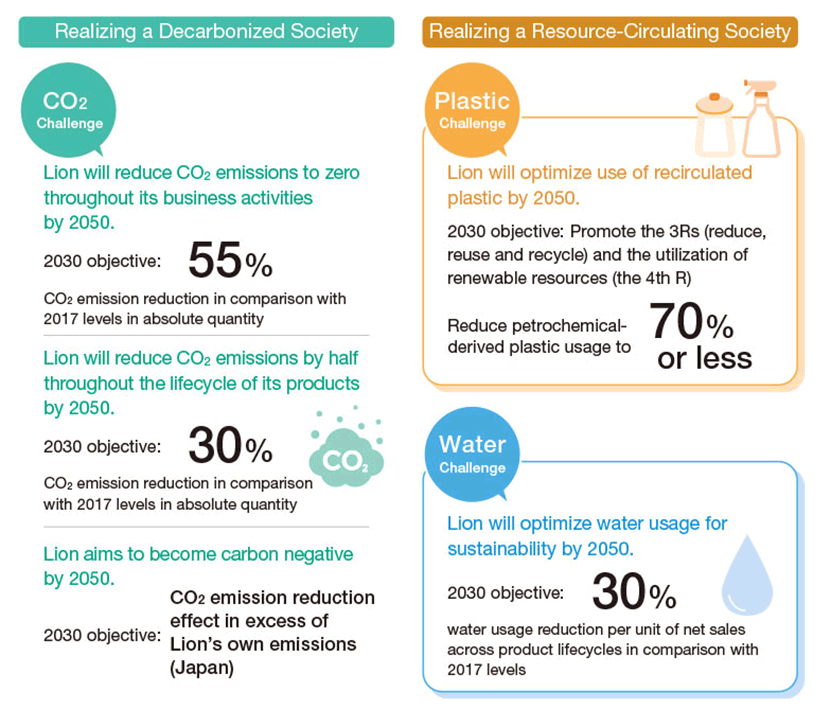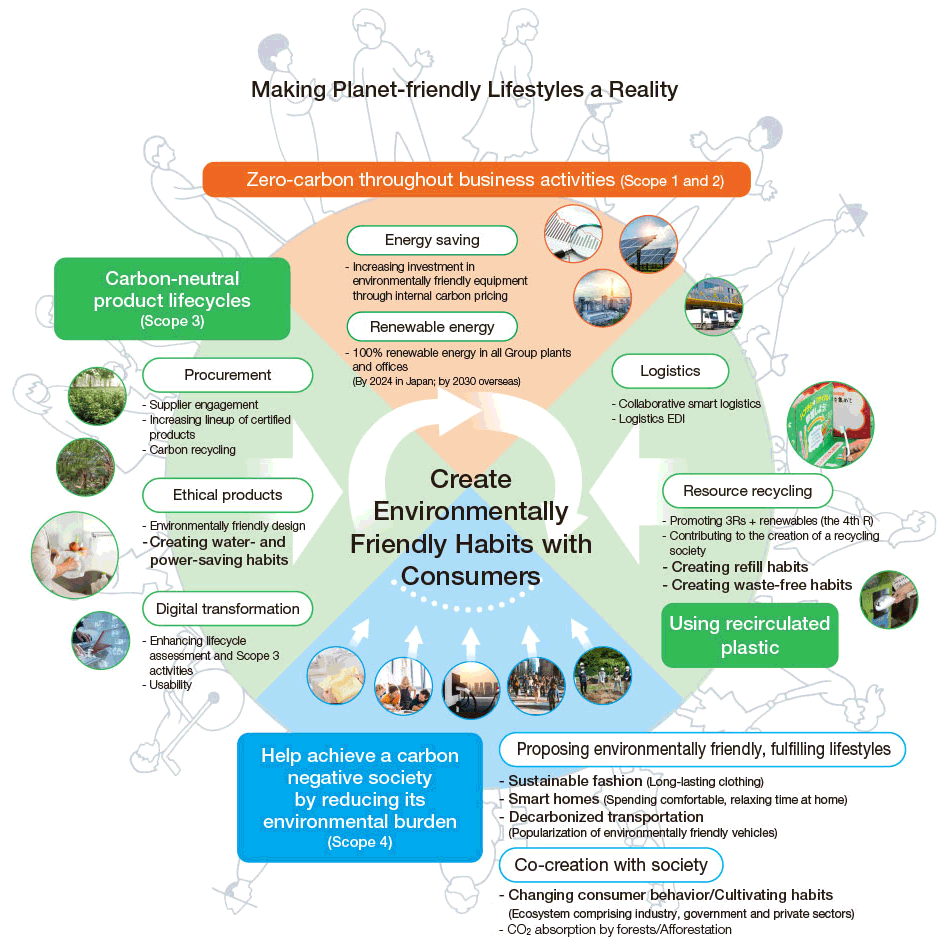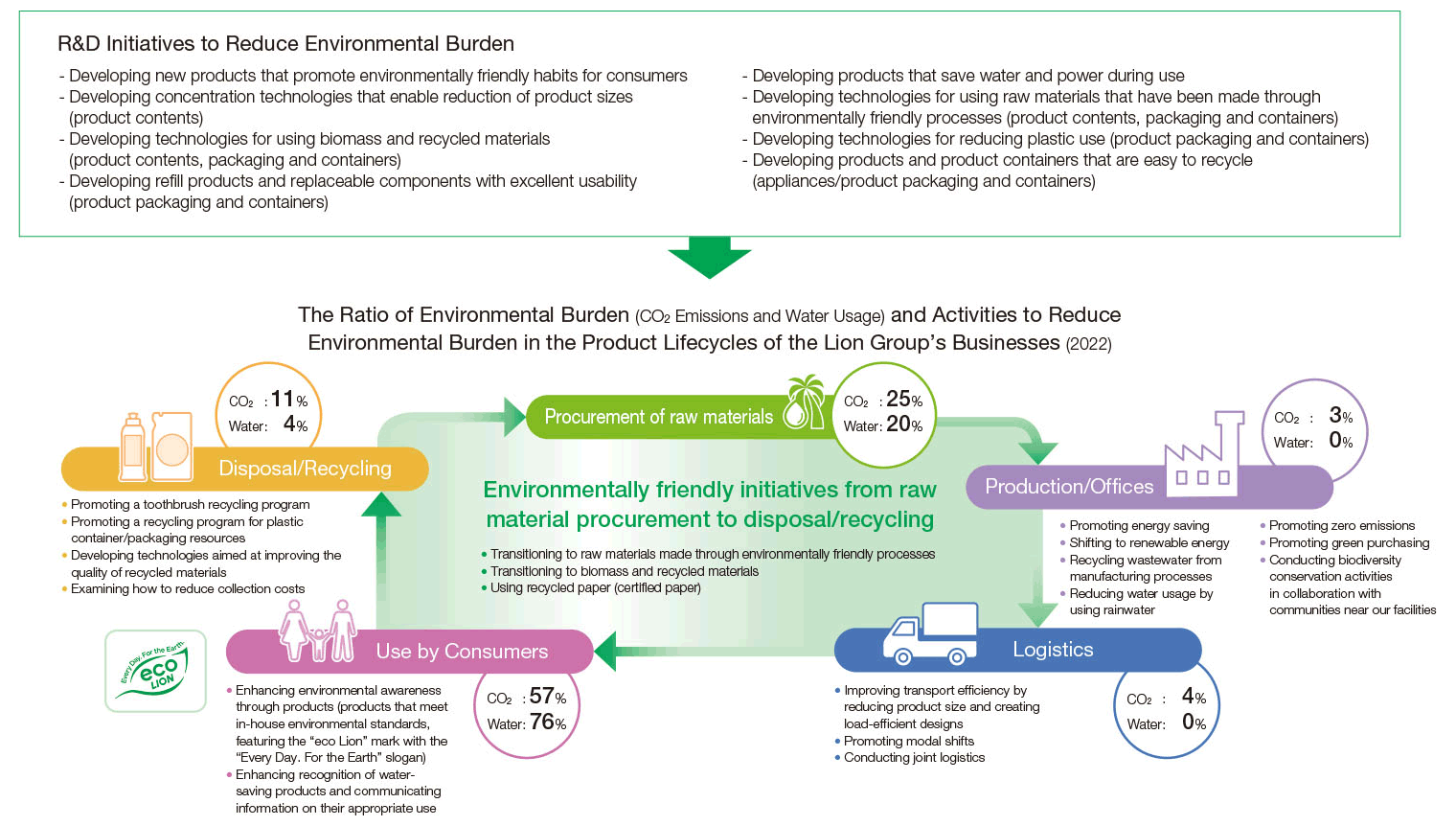In 2019, the Lion Group established the LION Eco Challenge 2050, a set of long-term environmental objectives, with the goal of promoting business activities that helping to address global problems, such as those identified in the Paris Agreement and the Sustainable Development Goals (SDGs). In 2022, many countries, including Japan, began raising their environment-and sustainability-related targets. We have also revised our objectives as we work to achieve carbon neutrality by 2050. Aiming to realize a decarbonized, resource-circulating society, we will promote environmentally friendly habits with consumers to continuously provide planet-friendly lifestyles that make more sustainable living easy.



As part of its responsibility as a producer, the Lion Group is working to achieve decarbonization and to solve plastic and water resource issues in every stage of the product lifecycle, from the procurement of raw materials to use by consumers, disposal and recycling. As laundry and other housework requires electricity and water, CO₂ emissions and water usage are at their highest at the stage when consumers use our products. Going forward, we will work to reduce the environmental burden of our products at this stage through the provision of environmentally friendly products and services and the creation of environmentally friendly habits for consumers.

Climate change has become a pressing social issue in recent years and presents serious future risks to corporate management as well as the possibility of new opportunities for corporate activities. Under the Vision2030 long-term strategic framework, the Lion Group has made reinforcing initiatives to address the sustainability material issues one of its management strategies and designated creating healthy living habits and promoting environmental initiatives for a sustainable planet as its top priority material issues. Accordingly, we are working to mitigate risk by reducing CO₂ emissions and other means while advancing a variety of initiatives to address the risks and opportunities presented by climate change, such as promoting the formation of environmentally friendly habits together with consumers.
In March 2023, Lion has had its greenhouse gas (GHG) reduction targets for 2030 validated by the Science Based Targets (SBT) initiative*1 as being based on sound scientific grounds and aligned with the target of limiting global warming to 1.5°C. This validation follows a previous validation from SBT in 2020 as being aligned with the target of limiting global warming to well below 2°C.

*1The SBT initiative (SBTi) is a collaborative international initiative established in 2015 by the CDP, the United Nations Global Compact (UNGC), World Resources Institute (WRI) and the World Wide Fund for Nature (WWF). The initiative assesses and validates whether GHG reduction targets set by companies based are properly science-based to help achieve the Paris Agreement goal of keeping the increase in the global average temperature to 1.5°C above pre-industrial levels.
■Validated GHG Reduction Targets (Targets for 2030)
*2 Scope 1: Direct emissions from the use of fuel by the Company.
*3 Scope 2: Indirect emissions from electricity and heat purchased and used by the Company.
*4 CO2 emissions account for 99.8% of Lion’s GHG emissions (2022 figure).
*5
Scope 3: Indirect emissions from the Company’s value chain (excluding those covered by Scope 1 and Scope 2) attributable to purchased goods and services (category 1) or end-of-life treatment of sold products (category 12).
News release: Lion’s Greenhouse Gas Reduction Targets Validated by the SBT Initiative
Under the Eco-First Program, companies make a commitment to the Minister of the Environment regarding their global warming countermeasures, efforts to reduce waste and promote recycling, and other voluntary initiatives to conserve the environment (Lion’s Eco-First Commitment [Japanese]). The Minister of the Environment then certifies that such companies are leaders in their industries in terms of implementing forward-looking, voluntary business activities in environmental areas.
In 2008, Lion became the first company in a manufacturing industry to be certified as a member of the Eco-First Program. Since then, we have updated our Eco-First Commitment in step with the establishment of long-term environmental objectives. The last such update was made in 2019 to reflect the LION Eco Challenge 2050 long-term environmental objectives.
The Eco-First Promotion Council [Japanese] is an organization established in December 2009 to reinforce coordination among environment-related governmental bodies and EcoFirst Program member companies, increase awareness of the program and further enhance initiatives to address environmental issues.
Since the council’s establishment, Lion has actively participated as a core member, serving as the chair company from fiscal 2012 to 2013 (Chairman: Lion President Itsuo Hama, current Lion Chairman). Lion is currently involved with council operations as the managing company.